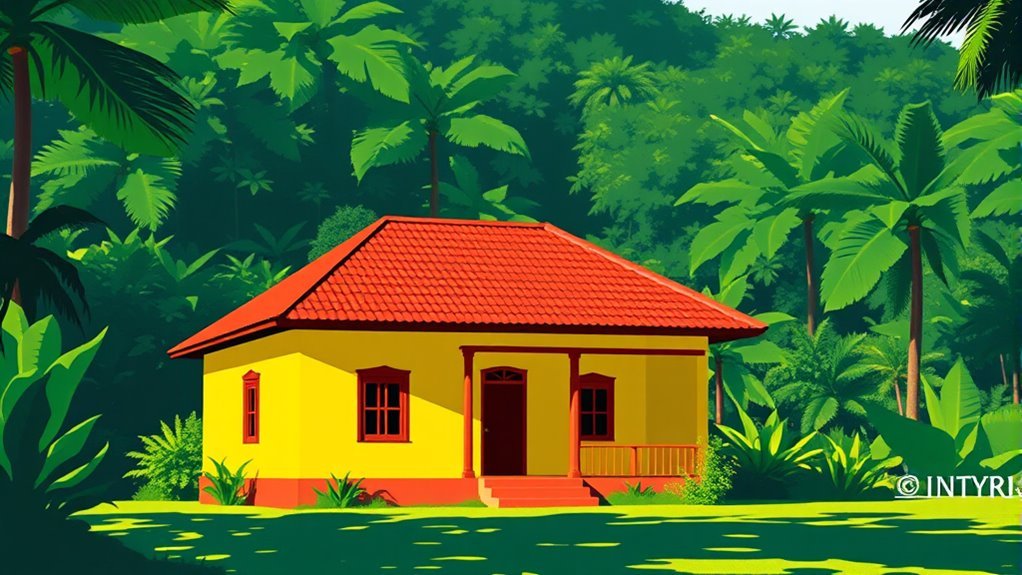Nicaragua offers pathways to financial success. Capitalize on tourism with tours, hospitality, or transportation. Real estate provides rental income and potential appreciation. Digital nomads benefit from a low cost of living through online work. Agriculture, especially coffee, presents opportunities too. Success requires understanding local regulations and demands. Discover further insights to unlock Nicaragua’s financial potential.
Main Points
- Capitalize on the booming tourism sector with tours, hospitality ventures, or transportation services catering to tourists.
- Invest in real estate, focusing on beachfront properties or colonial homes, for rental income or capital appreciation.
- Leverage digital nomad opportunities by teaching English, freelancing, or selling artisan crafts online.
- Explore agriculture through coffee production, cattle ranching, or diversifying into other crops, focusing on sustainability.
- Address key considerations like understanding tourist demands, reliable connectivity, and Nicaraguan land ownership regulations for success.
Riding the Tourism Wave
Nicaragua’s tourism sector has experienced substantial growth in recent years, presenting diverse opportunities for those seeking financial gain. Entrepreneurs can capitalize on the influx of visitors by establishing businesses tailored to tourist needs.
Tour operators, for example, can offer guided excursions to popular destinations like Granada, Ometepe Island, and the Corn Islands.
Hospitality ventures, such as boutique hotels, hostels, and restaurants, cater to a range of budgets and preferences. Transportation services, encompassing shuttle services and car rentals, can facilitate convenient travel for tourists exploring the country.
Success hinges on understanding tourist demands and providing high-quality, culturally sensitive experiences.
Real Estate: A Solid Investment?

The real estate market is another avenue for potential income generation. Nicaragua offers comparatively affordable property prices compared to other Central American countries. Investing in beachfront properties, colonial homes in Granada, or land for development can yield significant returns as tourism increases.
Rental income is a viable option, especially in popular tourist destinations. Property management services can handle the day-to-day tasks of renting out properties.
Capital appreciation is another potential benefit. As Nicaragua’s economy grows, property values are likely to increase over time. However, investors should conduct thorough due diligence.
Digital Nomad Dreams: Online Opportunities
Beyond real estate, online opportunities beckon, aligning with the digital nomad lifestyle. Nicaragua’s relatively low cost of living makes it an attractive base for remote workers.
English teaching remains a consistent demand, both online and in person. Freelancing, including writing, graphic design, and web development, presents viable income streams.
E-commerce offers possibilities, leveraging Nicaragua’s artisan crafts for online sales.
However, internet infrastructure can be a challenge in certain areas. Reliable connectivity is crucial for sustained online income. Thorough research into internet options is an important prior step for digital nomads.
Sowing Seeds of Success: Agriculture in Nicaragua
As a cornerstone of the Nicaraguan economy, agriculture presents diverse opportunities for entrepreneurs. Coffee production, deeply ingrained in Nicaraguan culture, offers investment potential, from sustainable farming to exporting premium beans.
Cattle ranching, another significant sector, benefits from Nicaragua’s fertile lands.
Diversifying into crops like beans, rice, and plantains, staples in the local diet, ensures consistent demand. Innovative approaches, such as organic farming and value-added processing, can enhance profitability and cater to niche markets.
Navigating land ownership regulations and securing reliable labor are crucial for success in Nicaraguan agriculture.
Common Questions
What Are the Average Living Expenses in Nicaragua?
Average living expenses in Nicaragua vary. Costs depend on lifestyle and location. Generally, one can live modestly on $500-$1,000 USD per month. This covers rent, food, and basic expenses. Higher lifestyles increase these figures.
Is It Safe for Foreigners to Live and Work?
Nicaragua’s safety for foreign residents is complex. Petty crime exists, and caution is needed. Certain areas have higher crime rates. However, many expats live and work safely by taking precautions and being aware of their surroundings.
What’s the Process for Obtaining Residency?
Obtaining residency involves gathering required documents, such as a birth certificate and police record. These must be apostilled. An application, with supporting documentation, is submitted to Nicaraguan immigration. An interview and processing fees are typically required before approval.
Are There Reliable Healthcare Options Available?
Reliable healthcare options in Nicaragua do exist, though quality can vary. Private hospitals offer higher standards, primarily in major cities. Public healthcare is available, but may face resource limitations and longer wait times. Expats often opt for private insurance.
What Are the Main Cultural Differences to Consider?
Cultural differences include communication styles and social hierarchies. Nicaraguans value relationships and directness may be perceived negatively. Understanding family importance, time perception, and religious influences aids integration and avoids misunderstandings in business and social settings.